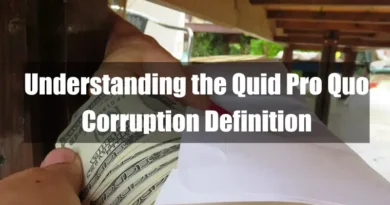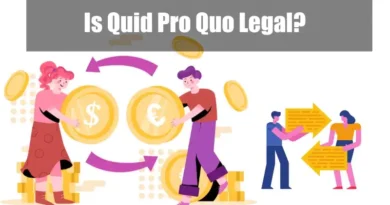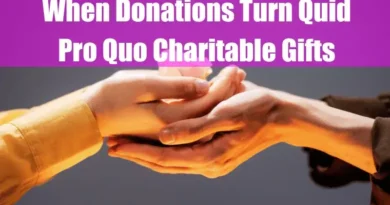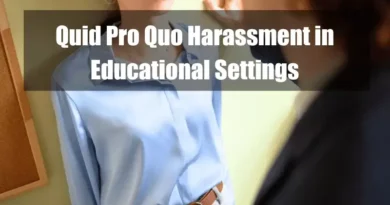Explaining Illicit Quid Pro Quo
Takeaways
| Key Points |
|---|
| Legal quid pro quo refers to voluntary, transparent exchanges where both parties benefit equitably, such as a simple purchase transaction. |
| In contrast, illicit quid pro quo involves illegal or unethical exchanges, often characterized by bribery, coercion, or abuse of power, and is typically done in secret to gain unfair advantages. |
| U.S. laws, such as Section 201 (Bribery of Public Officials) and Title VII of the Civil Rights Act, prohibit various forms of illicit quid pro quo, including bribery, sexual harassment, and discrimination. |
| Notable cases, like those of Sheldon Silver and Dean Skelos, highlight real-world examples of political corruption involving illicit quid pro quo. |
| This practice also extends to corporate, workplace, and educational contexts, where quid pro quo often involves bribery, insider trading, or harassment, all of which are legally addressed through frameworks like Title IX and Title VII, offering protections and legal recourse to victims. |
Introduction to Quid Pro Quo
Definition and Origins
Quid pro quo comes from Latin, meaning “something for something.” Historically, it referred to a straightforward exchange of goods or services of equal value, an integral part of commerce and legal transactions. Over time, however, its usage has shifted, particularly in legal and political contexts, where it often implies an unethical or illegal exchange.
Today, the term “illicit quid pro quo” is frequently associated with corruption, bribery, and other illegal activities, where one party offers something of value in return for a favor that breaches ethical or legal standards.
Differentiating Legal vs. Illegal Quid Pro Quo
Legal quid pro quo refers to legitimate exchanges where both parties agree to the terms voluntarily and the transaction is transparent and equitable. For instance, a simple purchase of goods in exchange for money is a legal quid pro quo.
Illicit quid pro quo, on the other hand, occurs when the exchange involves something illegal or unethical, such as bribery or coercion. These transactions often occur in secret and involve the abuse of power, where one party gains an unfair advantage at the expense of others.
Legal Framework of Illicit Quid Pro Quo

Overview of Relevant Laws
- U.S. Code Section 201 (Bribery of Public Officials): This statute makes it a federal crime for public officials to demand, seek, receive, accept, or agree to receive or accept anything of value in return for being influenced in the performance of any official act. This law is crucial in preventing public corruption and maintaining trust in government institutions.
- Title VII of the Civil Rights Act: This federal law prohibits employment discrimination based on race, color, religion, sex, and national origin. Under this act, quid pro quo sexual harassment is explicitly illegal. It occurs when job benefits are conditioned on the acceptance of sexual advances. Title VII provides a legal framework for employees to seek redress and ensures that workplaces are free from coercive and exploitative practices.
- Title IX of the Education Amendments of 1972 prohibits sex-based discrimination in any education program or activity receiving federal financial assistance. Under Title IX, quid pro quo harassment in educational settings is illegal. This occurs when a student is required to submit to unwelcome sexual conduct as a condition of participating in an educational program or activity. Title IX ensures that students have a legal avenue to challenge and seek redress for such misconduct, safeguarding the integrity of educational environments.
Key Legal Definitions and Concepts
Bribery:
Bribery is the offering, giving, receiving, or soliciting of something of value to influence the actions of an official or other person in a position of authority. It is a common form of illicit quid pro quo that involves corruption.
Extortion:
Extortion involves obtaining something, especially money, through force, threats, or coercion. While quid pro quo usually implies a mutual agreement, extortion involves one party being pressured into an unfair exchange.
Examples of Illicit Quid Pro Quo in U.S. Law
- Sheldon Silver Case (2015): Sheldon Silver, former New York State Assembly Speaker, was convicted on federal corruption charges, including quid pro quo arrangements. He was found guilty of receiving $4 million in illegal payments in exchange for political favors, particularly steering real estate developers to a law firm that paid him for referrals.
- Dean Skelos Case (2018): Former New York State Senate Majority Leader Dean Skelos was convicted of bribery, extortion, and conspiracy. Skelos was found guilty of using his political influence to secure lucrative contracts and payments for his sonin a classic quid pro quo corruption case.
Common Contexts of Illicit Quid Pro Quo

Political Context
Bribery and Corruption in Politics: In politics, illicit quid pro quo often manifests as bribery, where politicians exchange favors for financial or political support. This type of corruption undermines democratic processes and erodes public trust in government.
- Case Study – Sheldon Silver (2015): Sheldon Silver’s conviction is a prime example of political quid pro quo. He was charged with accepting millions in illegal kickbacks in return for legislative favors, which included steering state business to a law firm that paid him large sums under the table.
Corporate and Business Context
Insider Trading and Corporate Fraud: In the corporate world, illicit quid pro quo can involve insider trading, where executives share confidential information in exchange for financial gain. Such practices are illegal and punishable under securities law.
Unfair Business Practices and Competition: Companies may engage in quid pro quo by offering bribes or other inducements to secure contracts or suppress competition. These actions violate antitrust laws and can result in significant penalties.
Workplace Context
Quid Pro Quo Harassment: This form of harassment occurs when employment decisions are contingent upon accepting unwelcome sexual advances. It violates Title VII of the Civil Rights Act and can result in severe legal consequences for employers.
Legal Protections and Cases: Victims of quid pro quo harassment can seek justice under Title VII by filing a complaint with the Equal Employment Opportunity Commission (EEOC) or pursuing a lawsuit.
- Case Study – Meritor Savings Bank v. Vinson (1986): This landmark case established that quid pro quo harassment violates Title VII. The U.S. Supreme Court ruled in favor of Mechelle Vinson, who was subjected to sexual harassment by her supervisor, who conditioned her employment on her compliance with his advances.
Educational Context
Title IX and Quid Pro Quo in Education: Title IX prohibits discrimination based on sex in educational institutions. Quid pro quo harassment in this context often involves faculty members or administrators who demand sexual favors from students in exchange for grades, recommendations, or other academic benefits.
- Case Study – Franklin v. Gwinnett County Public Schools (1992): This case was significant in establishing that victims of quid pro quo harassment under Title IX could seek monetary damages. The U.S. Supreme Court ruled in favor of Christine Franklin, a student who was sexually harassed by a teacher, in exchange for not failing her in class.
Bribery, Extortion, and Illicit Quid Pro Quo: Comparative Analysis

Understanding the Overlaps and Differences
While bribery, extortion, and quid pro quo often overlap, they are distinct legal concepts. Bribery involves offering something of value to influence a decision or action, typically of an official. Extortion involves obtaining something through threats or coercion. Illicit quid pro quo can involve bribery and extortion but specifically refers to an exchange where one party gains an unfair advantage, often through corrupt means.
It is important to note that Illicit quid pro quo can involve bribery or extortion. Still, it specifically refers to an exchange where one party gains an advantage, which may or may not involve corrupt practices.
In cases of bribery or extortion, quid pro quo becomes illegal when one party benefits unfairly through coercion or corruption.
Legal Implications and Penalties
Engaging in illicit quid pro quo can result in severe legal consequences, including imprisonment, fines, and disqualification from holding public office. The legal outcomes depend on the case’s specifics, including the nature of the exchange and the harm caused.
High-Profile Cases and Legal Outcomes
- Rod Blagojevich Case (2011): Former Illinois Governor Rod Blagojevich was convicted on multiple corruption charges, including attempting to sell or trade President Obama’s vacated Senate seat in exchange for personal and financial benefits. This case exemplifies the severe penalties associated with political quid pro quo, as Blagojevich received a 14-year prison sentence.
Mechanisms of Proving Illicit Quid Pro Quo

The Role of Intent and Evidence in Legal Proceedings
Proving illicit quid pro quo in a court of law is often complex, requiring a clear demonstration of intent. In legal proceedings, intent is a crucial element that differentiates innocent transactions from corrupt exchanges. Prosecutors must establish that the accused knowingly engaged in a quid pro quo arrangement intending to influence or be influenced improperly.
Evidence plays a central role in these cases. It can include emails, recorded conversations, witness testimonies, financial records, and other documents demonstrating the exchange’s corrupt nature. The challenge often lies in proving that the exchange was not merely coincidental or innocent but was intended to secure an improper advantage.
- Case Study – Bob McDonnell v. United States (2016): In this Supreme Court case, former Virginia Governor Bob McDonnell was accused of accepting gifts and loans for political favors. The case highlighted the difficulty of proving illicit quid pro quo, as the Supreme Court eventually overturned his conviction, ruling that the government had not proven that McDonnell committed an “official act” in exchange for the gifts.
Burden of Proof and Legal Challenges
The burden of proof in criminal cases of illicit quid pro quo rests with the prosecution, which must prove beyond a reasonable doubt that the accused engaged in a corrupt exchange. This high standard of proof is necessary to prevent wrongful convictions but also makes prosecuting such cases challenging.
Legal challenges often include proving that both parties understood the exchange as quid pro quo and that the action or favor provided was directly linked to the item of value received. Defendants often argue that there was no explicit agreement or that the exchange was not corrupt, complicating the prosecution’s case.
- Case Study – United States v. Menendez (2017): U.S. Senator Robert Menendez was charged with corruption and accused of accepting gifts and campaign contributions in exchange for political favors. The jury deadlocked on the charges, leading to a mistrial. The case underscored the difficulties in proving quid pro quo, especially when the connections between the actions and benefits are not overtly explicit.
Case Studies: Successful Prosecutions and Defenses
Successful Prosecutions: Despite the challenges, there have been several successful prosecutions of illicit quid pro quo cases where strong evidence and clear intent were demonstrated.
- Case Study – William Jefferson (2009): Former U.S. Representative William Jefferson was convicted on multiple counts of bribery and racketeering after it was proven that he used his office to promote business ventures in exchange for cash payments. The evidence included marked bills in his freezer, which directly linked him to the corrupt activities.
Defenses: Defendants in illicit quid pro quo cases often argue that there was no explicit agreement or that the actions were taken independently of any exchange. They may also challenge the interpretation of evidence or the definition of “official acts,” as seen in the McDonnell case.
- Case Study – Rod Blagojevich: Blagojevich’s defense team argued that his actions were political bargaining rather than illicit quid pro quo. While this defense was ultimately unsuccessful, it illustrates the common strategies used to contest these charges.
Ethical and Social Implications

The Impact of Illicit Quid Pro Quo on Public Trust
Illicit quid pro quo arrangements significantly undermine public trust in institutions in government, business, or other sectors. When leaders or institutions engage in corrupt exchanges, it erodes confidence in the fairness and integrity of systems meant to serve the public. This loss of trust can have long-lasting effects, leading to widespread cynicism and disengagement from civic processes.
For example, the corruption scandals involving Sheldon Silver and Dean Skelos in New York shook public confidence in state governance, leading to calls for stricter ethics reforms and greater transparency in government dealings.
Socio-Economic Consequences
The socio-economic consequences of illicit quid pro quo can be profound. In the corporate world, such practices can distort markets, leading to unfair competition and economic inefficiencies. Companies that engage in bribery or fraud may gain short-term advantages. Still, they also risk severe penalties, including fines, loss of business, and reputational damage.
In the political arena, corruption can lead to misallocation of resources, as decisions are made based on personal gain rather than public interest. This can exacerbate inequality and hinder economic development, particularly in countries where corruption is endemic.
Policy Recommendations for Prevention and Control
Stringent legal measures, transparency initiatives, and ethical education are necessary to combat illicit quid pro quo. Key recommendations include:
- Strengthening Legal Frameworks: Laws against bribery, extortion, and corruption must be robust and enforced consistently. This includes updating existing legislation to address new forms of quid pro quo that may emerge in digital or globalized contexts.
- Enhancing Transparency: Public officials and business leaders should be required to disclose their financial interests and potential conflicts of interest. Transparency in government contracts and business dealings can help deter corrupt practices.
- Promoting Ethical Leadership: Education and training programs focused on ethics can help instill a culture of integrity in both the public and private sectors. Leaders should be held to high ethical standards, with clear consequences for violations.
- Encouraging Public Participation: Citizen engagement and oversight can be powerful tools in the fight against corruption. Mechanisms for reporting and addressing grievances should be accessible and effective, allowing the public to hold leaders accountable.
Conclusion
Illicit quid pro quo is a pervasive issue that affects various sectors, including politics, business, and education. It involves an illegal or unethical exchange where one party gains an unfair advantage, often at the expense of public trust and institutional integrity.
While proving such cases can be challenging, successful prosecutions demonstrate the importance of a robust legal framework and the need for ongoing vigilance.
Future Outlook on Legislation and Enforcement
The future of combating illicit quid pro quo will likely involve a combination of enhanced legal frameworks, greater transparency, and a stronger emphasis on ethical leadership. As societies grapple with the complexities of corruption, it will be essential to adapt and strengthen measures to ensure that institutions remain fair, transparent, and accountable.
Doing so makes it possible to mitigate the negative impacts of illicit quid pro quo and restore public trust in the systems that govern daily life.
FAQ
What is the legal definition of “quid pro quo”?
In legal contexts, “quid pro quo” is a Latin term meaning “something for something.” It refers to an arrangement where one party provides a benefit to another with the expectation of receiving something of comparable value in return. While such exchanges can be lawful, they become illicit when they involve corrupt intent or violate legal statutes.
How does “quid pro quo” relate to bribery under U.S. federal law?
Under 18 U.S.C. § 201, bribery involves the specific intent to give or receive a “thing of value” in exchange for an official act. This constitutes a quid pro quo arrangement where a public official’s actions are influenced by personal gain.
What constitutes an “official act” in the context of quid pro quo bribery?
An “official act” is defined as a decision or action on a matter involving a formal exercise of governmental power. This includes actions like awarding contracts, implementing regulations, or adjudicating disputes. The U.S. Supreme Court clarified this in McDonnell v. United States, emphasizing that routine political activities do not qualify as official acts unless they involve formal governmental decisions.
Can you explain the term “consideration” in contract law and its relation to quid pro quo?
In contract law, “consideration” refers to something of value exchanged between parties, which is essential for a valid contract. This mutual exchange embodies the concept of quid pro quo, where each party provides something to receive a benefit in return.
What is “quid pro quo” sexual harassment under Title VII of the Civil Rights Act?
“Quid pro quo” sexual harassment occurs when an individual in a position of authority demands sexual favors in exchange for employment benefits, such as promotions or salary increases. This form of harassment is prohibited under Title VII of the Civil Rights Act of 1964.
How does the Foreign Corrupt Practices Act (FCPA) address quid pro quo arrangements?
The FCPA prohibits U.S. individuals and businesses from offering or giving anything of value to foreign officials to influence official actions or secure improper advantages. Such quid pro quo arrangements are considered corrupt practices under the Act.
What is the “bargain theory” of consideration, and how does it relate to quid pro quo?
The “bargain theory” of consideration posits that a contract is valid if there is a mutual exchange of promises or benefits between parties. This theory aligns with the concept of quid pro quo, emphasizing reciprocal obligations.
Can campaign contributions be considered quid pro quo corruption?
Yes, if campaign contributions are given explicitly to influence an official act, they can constitute quid pro quo corruption. The U.S. Supreme Court has addressed this issue in cases like McCutcheon v. FEC, distinguishing between general support and direct exchanges for favors.
What is the “honest services fraud” statute, and how does it relate to quid pro quo?
The “honest services fraud” statute criminalizes schemes to deprive another of the intangible right to honest services, often involving bribery or kickbacks. Quid pro quo arrangements can be central to such offenses, where officials breach their duty by accepting benefits in exchange for favorable actions.
How does the Hobbs Act address quid pro quo extortion?
The Hobbs Act criminalizes extortion affecting interstate commerce, including situations where public officials obtain property from others through wrongful use of their office. Quid pro quo arrangements involving coercion or threats fall under this statute.
What is the “stream of benefits” theory in bribery cases?
The “stream of benefits” theory posits that a series of benefits provided to a public official can constitute bribery, even without a specific quid pro quo for each Act. The ongoing nature of the benefits implies an understanding of favorable treatment in return.
Can implicit agreements constitute quid pro quo corruption?
Yes, courts have recognized that explicit agreements are not always necessary; implicit understandings inferred from the circumstances can also constitute quid pro quo corruption, especially when behavior patterns suggest a mutual exchange of favors.
What role does “mens rea” (criminal intent) play in quid pro quo bribery cases?
“Mens rea,” or criminal intent, is crucial in establishing quid pro quo bribery. Prosecutors must prove that the defendant knowingly and willfully engaged in an exchange of value for official action, demonstrating corrupt intent.
How does the “facilitation payments” concept differ from quid pro quo bribery?
“Facilitation payments” are small sums paid to expedite routine governmental actions. While some jurisdictions permit them under specific circumstances, they differ from quid pro quo bribery, which involves corruptly influencing an official to perform or omit an act violating their lawful duty.
What defenses are commonly used in quid pro quo bribery prosecutions?
Common defenses include lack of intent, arguing that the exchange was not corrupt, absence of an explicit agreement, and asserting that the benefits provided were lawful and unrelated to any official act.









